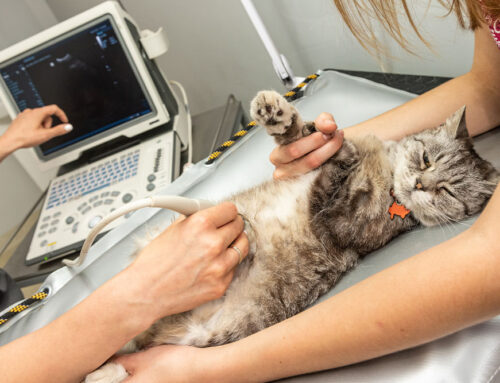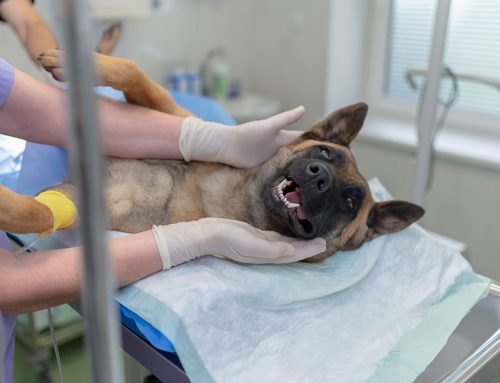Your furry, four-legged, life-support system perks you up, brightens your mood, and enriches your life. What can you do in return to improve their life in a loving way? The Burlington Veterinary Center team celebrates February, the month of love, with six ways to show your pet how much you care.
#1: Stimulate your pet’s mind
Life can become routine for our pets, so spice things up and keep them mentally alert. Here are some ways:
- Puzzle toys — Puzzles that require your pet to use their problem-solving skills to find a hidden treat or toy can also be a fun activity.
- Hunting activities — Hide treats or toys around the house in surprising places to entertain your pet. Consider an indoor hunting feeder for cats to activate their natural predator.
- Change the scenery — Take a new route around the neighborhood, drive to a different location for your walk, or meet a friend and their dog at a new park.
- Visual stimulation — Cats especially enjoy watching the outside world on a tall cat tree or window perch. Videos of birds or other animals can be exciting for them to watch.
- Training — Most dogs enjoy learning new commands, especially when training is rewarded with a tasty treat, toy, or special playtime. You may be surprised to know that training cats is also possible, and indoor cats can have an outdoor experience while on a cat harness and leash. Training your pet also can deepen your relationship and help eliminate frustrating behavior problems.
#2: Share a quality moment with your pet
When your pet stares into your eyes, a positive oxytocin feedback loop is initiated, similar to a mother’s experience with her infant. Research shows that dogs respond differently to a smiling face than a frown or neutral expression. A simple way to show your love is to look into your pet’s eyes and smile, and give them a pleasant moment of affection.
#3: Embrace exercise for your pet
All pets need regular exercise, including those who prefer to be couch potatoes. Explore your pet’s capabilities, and consider these ideas to enhance their exercise routine.
- Dog walking — More frequent, longer walks are always a great idea for your active dog. Vary the speed of the walks so your dog can slowly smell everything, or exercise briskly. Provide dog coats and boots so you can continue their walks during cold weather and avoid frostbite. A senior dog who suffers from arthritis can benefit from pain medication to provide comfort during low-impact exercise.
- Dog sports — Active dogs can take part in a wide variety of indoor and outdoor sports, such as flyball, lure coursing, agility, freestyle, dock diving, tracking, scent work, herding, earth dog trials, or frisbee.
- Active cat toys — Discover your cat’s prey preference and periodically rotate their toy selection to keep them interested. Encourage your cat to exercise with interactive play, such as wiggling a feather wand, rolling a ball, or tossing crumpled paper. Consider creating a box and bag obstacle course, with hidden treats or toys as rewards.
#4: Help your pet reach a healthy weight
Almost 40% of pet owners don’t realize their pet is pudgy, but obesity is the most common preventable health problem facing the pet population. Overweight pets are at higher risk for a number of health problems, and an overweight pet’s life span can be shortened by two years or more. Overweight pets tend to be more sedentary and less interactive with their owner. Pet owners are often surprised at how much happier their pets seem when they are closer to their ideal weight.
#5: Focus on your pet’s safety
Your beloved four-legged friend relies on you for their safety, so look around your home to ensure they can’t get into trouble. Keep all dangerous foods, plants, or breakable items out of paws’ reach. Avoid the heartbreak of losing your pet by ensuring they are well-identified with a microchip and a current nametag.
#6: Commit to your pet’s health
Although a “trip to the veterinarian” may not seem like love to your pet, keeping them healthy is part of a loving relationship. Regular wellness visits can help ensure they have a good quality of life, and live longer by your side. Your pet will feel better if you maintain their dental health, keep them current on vaccinations, and protect them from fleas, ticks, and heartworm disease. Know your pet’s normal behavior, and monitor them closely for early signs of pain or illness. Consider pet health insurance to cover the cost of their care, and to be prepared for any unexpected health crises.
Expressing love for your pet means learning how to meet their needs, and sharing a healthy and enjoyable life together. The Burlington Veterinary Center team appreciates your heartfelt bond with your pet, so don’t hesitate to contact us if you have any questions or concerns about their well-being.








Leave A Comment